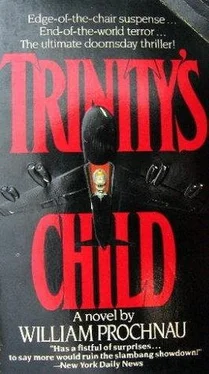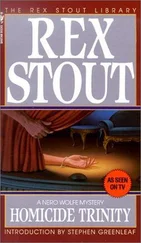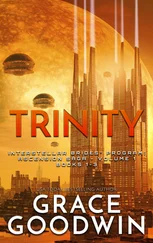William Prochnau - Trinity's Child
Здесь есть возможность читать онлайн «William Prochnau - Trinity's Child» весь текст электронной книги совершенно бесплатно (целиком полную версию без сокращений). В некоторых случаях можно слушать аудио, скачать через торрент в формате fb2 и присутствует краткое содержание. Город: New York, Год выпуска: 1985, ISBN: 1985, Издательство: Berkley Books, Жанр: Триллер, sf_postapocalyptic, на английском языке. Описание произведения, (предисловие) а так же отзывы посетителей доступны на портале библиотеки ЛибКат.
- Название:Trinity's Child
- Автор:
- Издательство:Berkley Books
- Жанр:
- Год:1985
- Город:New York
- ISBN:9780425077870
- Рейтинг книги:4 / 5. Голосов: 1
-
Избранное:Добавить в избранное
- Отзывы:
-
Ваша оценка:
- 80
- 1
- 2
- 3
- 4
- 5
Trinity's Child: краткое содержание, описание и аннотация
Предлагаем к чтению аннотацию, описание, краткое содержание или предисловие (зависит от того, что написал сам автор книги «Trinity's Child»). Если вы не нашли необходимую информацию о книге — напишите в комментариях, мы постараемся отыскать её.
There had been false alarms, of course: computer malfunctions, straying airliners, even flocks of geese showing up on radar as inbound waves of missiles. But by a miracle no-one had taken that final, irrevocable step. Until now.
Trinity's Child — читать онлайн бесплатно полную книгу (весь текст) целиком
Ниже представлен текст книги, разбитый по страницам. Система сохранения места последней прочитанной страницы, позволяет с удобством читать онлайн бесплатно книгу «Trinity's Child», без необходимости каждый раз заново искать на чём Вы остановились. Поставьте закладку, и сможете в любой момент перейти на страницу, на которой закончили чтение.
Интервал:
Закладка:
“The card, admiral.”
Harpoon stopped, placing the satchel on the table, and opened it. He withdrew a blue-and-red plastic card, charge-plate size. He looked at it briefly. Across the top was a series of random letters and numbers. In the center, the card said: “top secret crypto, nsa.” At the bottom it said: “sealed authenticator system.”
“You’ll need this,” Harpoon said, handing it to the successor. “Orders to the bombers must go through the Looking Glass. The code at the top will prove you are authentic. The colonel will give you the word codes.”
The successor looked briefly at the card, then raised his eyes to the admiral. “You really forgot to give me this, Harpoon?”
Harpoon looked at the man but felt his eyes glaze. The disconnected thoughts, interrupted by the group’s arrival, rattled erratically in dark crannies of his head again. If the earth falls in the wilderness, does it make a sound? Did a Beethoven ever make music, a Shakespeare poetry? Out of darkness, into darkness. If you deny the future its existence, did you exist? Chess is such a simple game. “I’m really not sure, sir,” Harpoon said, and walked away.
TEN
• 1130 Zulu
The Looking Glass general withdrew a pack of Pall Malls from their normal niche, a cubbyhole to the right of the red lockbox and below a small countdown clock no larger than a starter’s watch. The cigarettes were a ritual. He smoked now only on Looking Glass nights, his wife frowned on it so. Each time he drew the duty, he conducted the preflight briefing, stopped at the vending machine en route to the runway bus, bought a single pack, and slipped it into his flight jacket. Aboard the aircraft he always placed the pack in the same cubbyhole, as if to hide them here, too. At the end of the eight-hour flight he conducted the debriefing, breaking cover by smoking one last cigarette on the ground, and then discarded the pack in a litter can before the drive home into the suburbs. The discarded pack invariably was three-quarters full.
The general took a single cigarette now, caressing it as he might a fine Havana, tapped it twice on die Top Secret papers in front of him, and snapped a match. The match’s flare coincided with the flashing white light on the black phone. He stared at the phone, expecting its signal, and finished the ritualistic lighting of the cigarette as he lifted the receiver.
At first he heard nothing, which was unusual, so he said, “Alice here.”
The pause continued briefly and then he heard in a slightly awkward drawl: “Condor speakin’.”
“Day word?” Alice asked.
“Cottonmouth.”
“Command word?”
“Trinity.”
“Action word?”
“Jericho.”
“You have your card, sir?”
“I do.”
“In the upper-left-hand comer, you see a row of digits and letters. Please read the fourth from the left.” In front of him, near a tin-cup ashtray, Alice examined a small blue-and-red plastic card, charge-plate size.
“Seven.”
“In the right-hand corner, please read me the final three digits and/or letters.”
“Seven C Two.”
“C for what, sir?”
There was a pause and a slight grump. “Charlie.”
“On the second line from the top, please read me the middle sequence.”
“Six D Six Two.”
“D for what, sir?”
“Dawg, dammit. All you people waitin’ on World War Four, Alice?”
Alice started to chuckle, then looked at the papers in front of him and lost the laugh. “You wish to issue order changes, sir?”
“Sure as hell do.”
“Harpoon gave you the signal code?”
“Harpoon’s temporarily incapacitated.”
Alice took a long burning drag on his Pall Mall. “Sir?”
“Code’s Two One Zebra. Zeee-bruh.”
“Repeating, Two One Zebra.”
“Yes.”
The general paused, catching his aide staring at him. Sam’s eyebrows lifted. They had known it would be 21-Z, Harpoon telling Alice as much in the brief call earlier. Where the devil was Harpoon? The general felt uneasy. “Would you like some advice, sir?”
“Been gettin’ plenty down here.”
Alice decided to ignore the warning. “I’m sure, sir. But the situation’s fluid.”
“Fluid. Been everything else tonight. Might as well be fluid. What’s that mean?”
“We found another eye, sir. That’s three satellites now. Also received our first message from the ground. Garbled. But coded and scrambled. Means it’s part of the system.”
“Where from?”
“Not sure, sir. Washington region.”
Now Condor paused. “That’s good news,” he said after a second. “What’s it got to do with Two One Zebra?”
“We’re getting things back, sir. Slowly. I’d orbit and wait.”
“Wait.” The line was silent for a moment. “Don’t see the point, Alice, but I’ll ask the colonel.”
Alice sagged. The colonel, for Christ’s sake?
The voice came back. “Colonel says they ain’t got the gas for a loose fart, Alice. Wants to know the battle order.”
Alice didn’t know how to answer. The baker’s dozen had slipped from thirteen to eleven. Especially with satellite eyes and radio ears opening, even if it was no more than a blink and a peep so far, he was being more cautious than he had been with Harpoon. “Dallas Cowboys,” he finally said.
“What the hell’s that mean?”
“This is all extremely sensitive, sir. Ask your aide.”
Alice could hear muffled talking on the other end. He pulled on the cigarette, dropping ashes on the papers beneath.
“Okay,” the voice said. “Implement Two One Zebra.”
“It’ll take a few minutes, sir.”
“You stallin’, Alice?” The voice bit. “Had just about enough of that tonight.”
“No, sir. We have to do a hand sort. Assignments. Priorities. Alternates. It’s tight. I have to put them in orbit briefly, so none of them goes over the side.”
“Over the side?” The voice sounded suspicious.
“We’re saying too much, sir. Out of listening range.”
“Okay.” Condor’s words turned steely. “Now, you get your tail movin’, Alice. I want this workin’. Fast. Hear?”
“Yes, sir,” Alice said. He also heard the phone click off. He felt Sam’s eyes on him and looked up at his old friend.
“We got ourselves a new White House military aide,” the general said. “The Librarian.”
“You’re kidding? Jesus, no wonder we got 21-Z.”
“Yes. Well, send out the orbit orders so we don’t lose any of ’em in the weeds. Figuring this out is going to be like wrestling with Rubik’s Cube.”
“The crews will think we’re going nuts back here.” The general looked at Sam. “Well?” He felt the cigarette burning his fingers and he snuffed it out in the tin tray. He turned his attention to the papers on his desk-console, brushing away the Pall Mall’s fallen remnants. He glanced down the top sheet, his eyes stopping on:
CHEREPOVETS: Construction, 1977. Cover, Rybinsk Mining Works. Thirty-five miles southeast town Cherepovets; 240 miles north Moscow. Intelligence data: Primary relocation site (timing option one) Soviet Premier, Chief KGB, Minister Defense, Commanding General Soviet Rocket Forces, etc. Hardened at least 1,000 psi.
Okay, Alice in Wonderland, the general said to himself. Start there. He shook his head. The Librarian. Good grief.
Genocide was a twentieth-century word. That he knew. Immediately after the Second World War, at about the time of the Nuremberg trials of the Jew exterminators, they took the Greek root word genos and put it together with the Latin suffix cida. The word had been misused regularly ever since, man’s technology having overtaken man’s perversities before the word was conceived. They had no proper word now. Genocide meant the discriminate destruction of one genus of the species, not the indiscriminate destruction of the species itself. They should have a proper word for it. That bothered him. He struggled with proper prefixes for cida. Specicide? Humanuscide? Anthropocide? The little compartment to which he had withdrawn was very confining, the weight pressing on him. He stared at the single phone, feeling an abounding need to share his problem. There was no one to call. Except Alice. And Alice was busy doing whatever you call it. Then he realized that words were for the living, connectors between anthropoids, connectors between the past, the present, and the future. If it works, they won’t need the word. If it doesn’t work completely, someone else could figure it out. At some place like Nuremberg.
Читать дальшеИнтервал:
Закладка:
Похожие книги на «Trinity's Child»
Представляем Вашему вниманию похожие книги на «Trinity's Child» списком для выбора. Мы отобрали схожую по названию и смыслу литературу в надежде предоставить читателям больше вариантов отыскать новые, интересные, ещё непрочитанные произведения.
Обсуждение, отзывы о книге «Trinity's Child» и просто собственные мнения читателей. Оставьте ваши комментарии, напишите, что Вы думаете о произведении, его смысле или главных героях. Укажите что конкретно понравилось, а что нет, и почему Вы так считаете.












